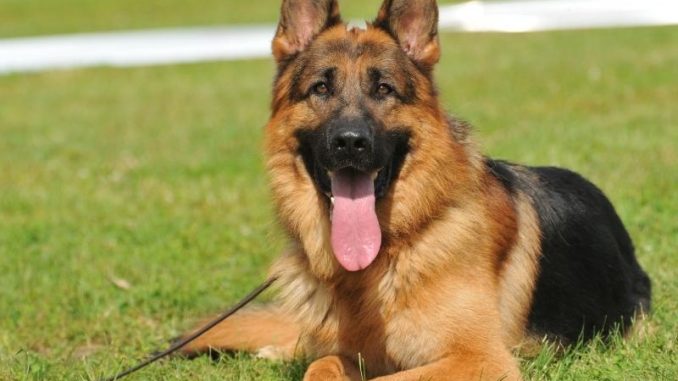
From the first moment I encountered the King Shepherd, also called Giant German Shepherd, their distinctive stature and demeanor captured my attention. This magnificent breed is a result of careful crossbreeding between the German Shepherd and the Shiloh Shepherd, creating a dog that combines the best attributes of both—robust and remarkably gentle. As someone who cherishes breeds that provide both strength and softness, like my beloved English Bullmastiff, the King Shepherd strikes a perfect balance.
Imagine a dog that carries the classic shepherd look but with a softer, more majestic bearing. The King Shepherd embodies this blend—powerful, intelligent, and exceptionally affectionate. Their impressive presence coupled with a gentle disposition makes them outstanding companions.
Join me as we explore the world of King Shepherds. If you’re attracted to dogs that are as loyal as they are formidable, this breed might just capture your heart. Let’s uncover what makes the King Shepherd a truly noble choice for both families and individuals.
TABLE OF CONTENTS
- King Shepherd Quick Breed Summary
- Origins of King Shepherd
- Physical Characteristics of King Shepherds
- Personality and Temperament of King German Shepherd
- Taking Care of a King Shepherd
- Training Needs of the King Shepherd
- The Most Common Health Problems in King Shepherds
- Costs of Owning a King German Shepherd
- FAQs — A Deeper Dive into King Shepherds
- So, Is the King Shepherd Right for You?
King Shepherd Quick Breed Summary
Origins of King Shepherd
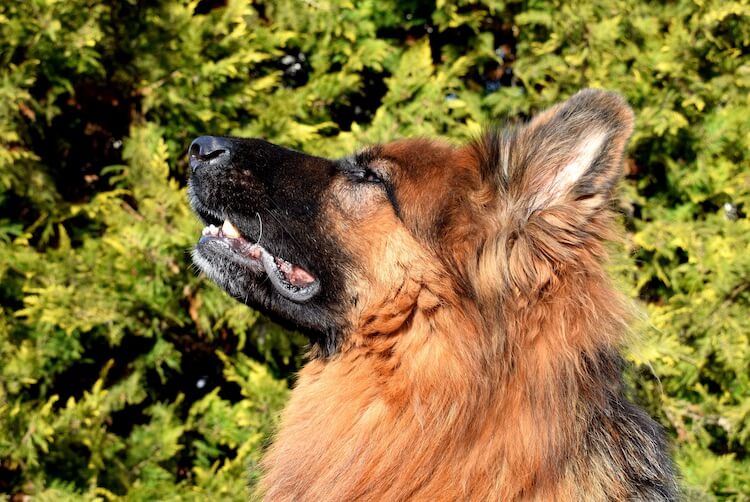
From Adobe Stock
The King Shepherd is a striking and relatively new breed that represents a successful endeavor in canine hybridization. Crafted to combine the best traits of its forebears, this breed offers the ideal blend of strength, intelligence, and temperament suited for a variety of roles from family companion to working dog.
German Shepherd
The German Shepherd, one of the primary contributors to the King Shepherd breed, is renowned for its intelligence, versatility, and loyalty. Originating in Germany in the late 1800s, this breed was initially developed for herding sheep but quickly became a favorite for various roles in police work, military applications, and service tasks due to its keen intelligence and trainable nature. Their strong protective instincts and high activity level make them excellent working dogs.
Shiloh Shepherd
The Shiloh Shepherd, the other key component in the creation of the King Shepherd, was developed in the United States in the 1970s. This breed was specifically bred to be larger and have a calmer temperament than the traditional German Shepherd, addressing some health and temperament issues present in its predecessor. The Shiloh Shepherd also boasts a friendlier disposition, making it well-suited for family life and therapy work, while still retaining the intelligence and trainability of the German Shepherd.
Development of the King Shepherd
The King Shepherd was developed during the 1990s by American breeders Shelley Watts-Cross and David Turkheimer. Their goal was to create a breed that retained the German Shepherd’s best qualities—intelligence, strength, and loyalty—but with a larger size and a more balanced temperament. They began by carefully selecting German Shepherds and Shiloh Shepherds that exemplified these traits and commenced a breeding program aimed at establishing a new, distinct line.
The breeders focused on enhancing the health and physical structure in the King Shepherd, aiming to reduce the common health issues found in the German Shepherd, such as hip dysplasia. Over time, the King Shepherd has evolved to become a recognized breed known for its majestic appearance, gentle demeanor, and robust health.
The development of the King Shepherd is a testament to the breeders’ dedication to enhancing the qualities of the German and Shiloh Shepherds, creating a unique and powerful breed that excels as both a working dog and a companion. The breed continues to gain popularity and recognition for its admirable traits and versatile capabilities.
Physical Characteristics of King Shepherds
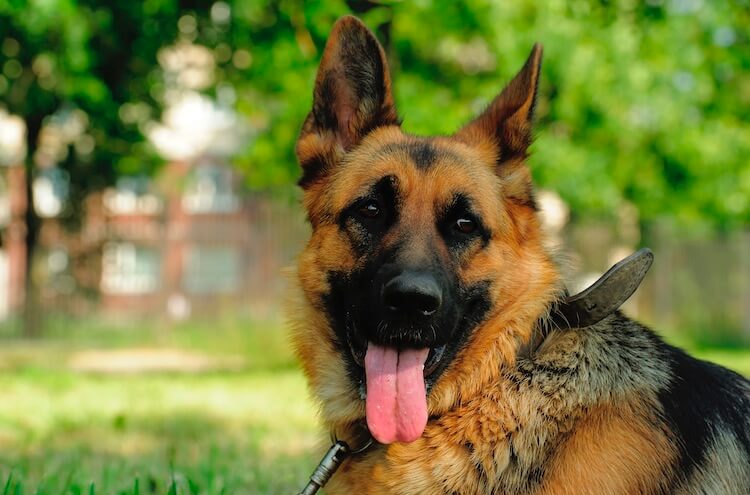
From Adobe Stock
Meeting a King Shepherd for the first time is an unforgettable experience. These dogs combine robust strength with regal beauty, creating an impressive and noble appearance that reflects their heritage.
Height and Weight
When you first meet a King Shepherd, you can’t help but be impressed by their size. Males typically stand between 27 to 31 inches at the shoulder, while females are slightly smaller, generally ranging from 25 to 29 inches.
As for weight, a healthy adult King Shepherd can tip the scales at anywhere from 90 to 150 pounds. My own experience with these dogs has taught me that their imposing size is matched by their immense heart and gentle demeanor.
Coat and Color
One of the most striking features of the King Shepherd is their luxurious coat. They have a dense, weather-resistant double coat that can be either straight or slightly wavy. This coat keeps them comfortable in both cold and moderate climates.
In terms of color, they exhibit a variety of patterns ranging from black and tan to sable or even solid black. The diversity in their coat color adds to their majestic appearance, making each one uniquely beautiful.
Other Physical Features
Beyond their size and coat, King Shepherds have a powerful build with a broad head and muscular limbs. Their eyes are medium-sized, almond-shaped, and usually dark brown, conveying an expression of intelligence and alertness.
One thing that always catches my attention is their erect ears, which add to their alert and ready-to-work appearance.
Their tail is bushy, and they carry it lower than their backline, which is quite different from some other shepherd breeds.
The physical attributes of the King Shepherd not only contribute to their functionality as working dogs but also enhance their aesthetic appeal. Whether they’re standing guard or sprawling lazily in your living room, their robust physique and striking features make them a notable presence.
Personality and Temperament of King German Shepherd
King Shepherds are known for their impressive size and noble bearing, but it’s their personality and temperament that truly endear them to their families. As someone deeply passionate about dogs, particularly large breeds, I’ve always admired King Shepherds from afar. Their calm demeanor combined with a keen intelligence makes them not just pets, but truly members of the family.
Gentle Giants
Despite their formidable size, King Shepherds are often referred to as gentle giants. They exhibit a calm and steady temperament that makes them excellent companions, especially for families with children. Their patient and protective nature is something I’ve observed at dog parks and during pet community events, where they interact with a gentle composure that is both reassuring and heartwarming.
- Family-Oriented: King Shepherds are deeply loyal and form strong bonds with their family members. They are particularly gentle with children, often taking on a protective yet nurturing role.
- Social Interaction: They tend to be sociable with other dogs and pets, especially when socialized from a young age. This makes them well-suited for households with multiple pets.
Intelligent and Trainable
King Shepherds inherit the German Shepherd’s intelligence, making them highly trainable and eager to please. Their quick learning ability is something that many trainers and owners appreciate. Whether it’s basic obedience training or more complex tasks, King Shepherds grasp new commands with ease, which is a trait I’ve admired in interactions during obedience classes where they often excel.
- Training Sessions: Regular training sessions are not just a way to teach new commands but also an excellent opportunity to engage their minds and strengthen your bond with them.
- Problem-Solving Skills: They enjoy challenges that involve problem-solving, which can be incorporated into playtime and training routines.
Calm and Composed
One of the most notable traits of the King Shepherd is their composure. They are known for their ability to remain calm in various situations, which makes them excellent candidates for therapy and service roles. Their presence at community events and their calm demeanor in bustling environments are testaments to their well-balanced temperament.
- Adaptability: They adapt well to different living environments as long as they have enough space to move and sufficient exercise. This adaptability also shows in their ability to cope with changes in their routine or environment.
- Emotional Sensitivity: King Shepherds are sensitive to the emotions of their human companions, often showing an ability to comfort those in distress. This emotional intelligence also makes them responsive and attuned to the needs and moods of their family members.
Taking Care of a King Shepherd
Caring for a King Shepherd is a rewarding endeavor that requires attention to their unique needs. As the proud companion of a large breed myself, I understand the commitment involved in ensuring these majestic dogs lead a healthy, happy life.
Feeding
Feeding a Giant German Shepherd properly is crucial for their health and well-being. Given their size and energy levels, these dogs require a balanced diet rich in nutrients. I recommend high-quality dry kibble designed for large breeds, which helps ensure that they receive the appropriate amounts of protein, fat, and fiber.
It’s also important to consider their life stage—puppy, adult, or senior—as each stage requires different nutritional focuses.
- Puppy Stage: Focus on foods specially formulated for large breed puppies to support their rapid growth and development.
- Adult Stage: Maintain a diet that supports their energy levels but be mindful of overfeeding to prevent obesity.
- Senior Stage: Include more easily digestible foods and those supportive of joint health and reduced calorie intake as their activity level declines.
Feeding my dogs at consistent times each day helps regulate their metabolism and keeps them in top health. Also, always ensure fresh water is available to keep them well-hydrated, especially after exercise or during hot weather.
Grooming
Grooming a King Shepherd is more than just a beauty routine; it’s essential for their health. Their thick double coat needs regular brushing to prevent matting and manage shedding, especially during the change of seasons when they shed more heavily. I recommend brushing your King Shepherd at least twice a week with a de-shedding tool or a sturdy pin brush.
- Bathing: Bathe your King Shepherd every 3-4 months or as needed. Over-bathing can strip their coat of natural oils, so it’s important to use a gentle dog-specific shampoo.
- Nail Trimming and Ear Care: Regularly check and trim their nails, typically once a month, and keep an eye on their ears for signs of infection or irritation.
Exercise
King Shepherds require significant amounts of exercise to maintain their health and happiness. They thrive on being active and enjoy a variety of activities. Daily walks are essential, but they also benefit from more vigorous exercise like running, hiking, or agility training. I’ve found that a good mix of both mental and physical stimulation keeps them most content.
- Daily Routine: Aim for at least an hour of exercise daily. This can be split into two sessions of 30 minutes each to keep it manageable.
- Mental Stimulation: Include training sessions or puzzle toys to keep their minds active. King Shepherds are intelligent and enjoy challenges that keep them mentally sharp.
Training Needs of the King Shepherd
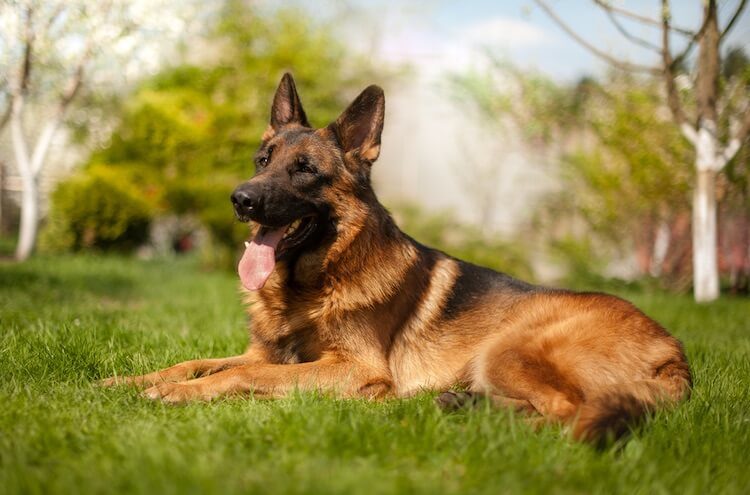
From Adobe Stock
Training a King Shepherd is an essential aspect of their care, contributing significantly to their well-being and their ability to integrate well into family life. Known for their intelligence and eagerness to learn, King Shepherds respond well to consistent, positive training methods.
As someone who’s interacted with numerous breeds at various training levels, I’ve noticed that King Shepherds stand out for their trainability and responsiveness.
Early Socialization
One of the most crucial aspects of training a King Shepherd is early socialization. Introducing them to a variety of people, environments, and other animals from a young age helps prevent any potential for shyness or aggression as they grow. This breed thrives on positive experiences that build their confidence and sociability. Regular visits to parks, busy streets, and pet-friendly stores can provide valuable learning experiences, enhancing their natural adaptability.
Obedience Training
Obedience training should begin as soon as a King Shepherd puppy is brought home. They are capable of learning basic commands such as ‘sit’, ‘stay’, ‘come’, and ‘heel’ from an early age. Due to their size and strength, it’s particularly important for King Shepherds to master these commands to ensure they can be controlled in public spaces.
Consistent, reward-based training sessions reinforce positive behavior and foster a strong bond between the dog and the owner. I’ve always been impressed by how quickly King Shepherds can progress in obedience training when given consistent guidance and positive reinforcement.
Advanced Training and Mental Stimulation
King Shepherds are not only capable of basic obedience; they also excel in more advanced training and activities. These can include agility training, search and rescue operations, and therapy work. Their intelligence and work ethic make them ideal candidates for these demanding roles.
Providing mental stimulation through advanced training keeps their mind sharp and allows them to utilize their problem-solving skills. Activities like puzzle toys, hide-and-seek with treats, and learning new tricks are great ways to keep a King Shepherd engaged and mentally active.
Consistency and Patience
As with any large and intelligent breed, training a King Shepherd requires consistency and patience. They respond best to calm, assertive, and consistent leadership. Changing rules or sporadic training sessions can lead to confusion and inconsistent behavior. It’s important to establish and maintain clear boundaries and rules that are consistently enforced. King Shepherds, with their quick minds and loyal natures, quickly adapt to structured environments where expectations are clear and consistent.
The Most Common Health Problems in King Shepherds
King Shepherds are majestic and robust dogs, but they are prone to certain health issues typical of large breeds. Being aware of these conditions and understanding how to manage or prevent them is essential for maintaining the health and happiness of your King Shepherd.
Hip and Elbow Dysplasia
Hip and elbow dysplasia are developmental conditions where the hip or elbow joints fail to develop properly, which can lead to arthritis and pain. Symptoms include limping, difficulty rising, reluctance to run or jump, and pain when moving.
- Maintain a healthy weight to reduce stress on joints.
- Provide a balanced diet with appropriate nutrients to support joint health.
- Engage in regular, moderate exercise to strengthen muscles around the joints.
- Consider supplements like glucosamine and chondroitin to support cartilage health.
- Regular veterinary screenings can help catch dysplasia early, allowing for better management strategies.
Gastric Dilatation-Volvulus (Bloat)
Bloat is a life-threatening condition where the stomach fills with air and may twist, cutting off blood flow. Symptoms include a swollen abdomen, restlessness, drooling, and attempts to vomit. Bloat can rapidly affect a dog’s quality of life and requires immediate veterinary care.
- Feed several small meals throughout the day instead of one large meal.
- Ensure rest before and after eating—no vigorous exercise or play.
- Use slow-feeder bowls to reduce the rate of ingestion.
- Keep a calm and stress-free eating environment.
- Regularly discuss with your vet any signs of digestive distress or changes in eating habits.
Degenerative Myelopathy
Degenerative myelopathy is a progressive disease of the spinal cord that leads to paralysis in the hind limbs. Early signs include loss of coordination and dragging of the feet. As it progresses, it severely affects the dog’s quality of life by limiting mobility.
- There is no known prevention, but monitoring for early signs can aid in management.
- Engage in physical therapy to slow progression and maintain muscle tone.
- Utilize mobility aids such as harnesses and wheelchairs to improve movement.
- Maintain a comfortable environment to prevent injuries.
- Regular veterinary visits for supportive care and to adjust treatment plans as needed.
Thyroid Issues
Hypothyroidism involves decreased production of thyroid hormones, leading to symptoms like lethargy, weight gain, cold intolerance, and changes in the coat. This condition affects the overall metabolic health of the dog.
- Regular thyroid testing, especially if symptoms are observed.
- Daily thyroid hormone replacement therapy, as prescribed by a vet.
- Monitor weight and adjust diet to prevent obesity.
- Keep a consistent routine to support overall health and stress reduction.
- Regular vet check-ups to adjust medication as needed and monitor overall health.
Costs of Owning a King German Shepherd
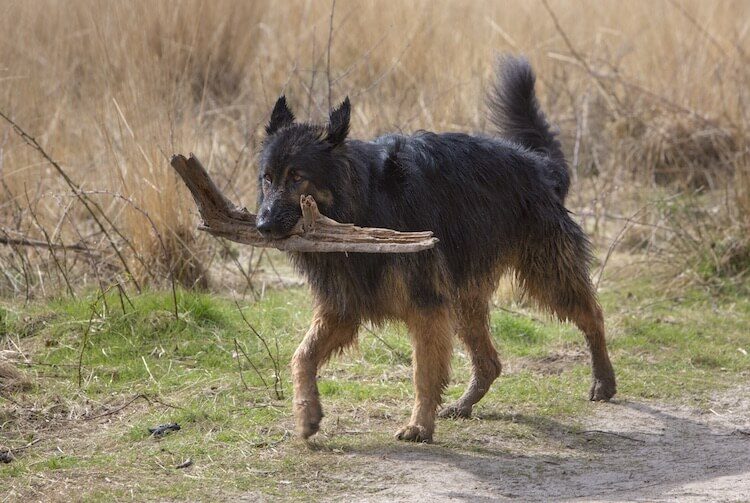
From Adobe Stock
Owning a King Shepherd, like any large breed dog, comes with its own set of financial responsibilities. These majestic animals require a considerable investment not only emotionally but also financially. From initial costs to ongoing expenses, here’s a breakdown of what you can expect when you decide to welcome a King Shepherd into your home.
Initial Costs
The initial purchase price of a King Shepherd puppy can vary significantly based on the breeder’s reputation, location, and the puppy’s lineage. Prices can range from $1,500 to $3,000 or more for well-bred specimens. However, the purchase price is just the beginning.
- Puppy Vaccinations and Health Checks: Puppies require several rounds of vaccinations in their first year as well as routine health checks which can add up to $200-$500.
- Spaying/Neutering: If you plan to spay or neuter your dog, expect to spend about $200-$500 depending on your location and the veterinary services.
- Initial Supplies: Basic supplies including a crate, bedding, bowls, a collar, leash, and toys can total $200-$300.
- Training: Professional training classes are highly recommended, especially for a breed as large and intelligent as the King Shepherd, and can cost $150-$250 for basic obedience courses.
Ongoing Costs
Owning a King Shepherd doesn’t just come with initial costs; there are ongoing expenses to consider as well.
- Food: King Shepherds require a significant amount of high-quality dog food. Depending on the brand and type, expect to spend about $60-$100 per month on dog food.
- Veterinary Care: Routine vet visits for vaccinations, health screenings, and occasional treatments for issues like fleas and ticks can average $200-$400 annually. This does not include unexpected health issues or emergencies.
- Grooming: While King Shepherds are not the most high-maintenance breed in terms of grooming, regular brushing, nail trims, and occasional professional grooming sessions can cost around $30-$100 per visit.
- Pet Insurance: Considering their size and potential health issues, pet insurance is advisable. Premiums can range from $30-$70 per month depending on the coverage.
Hidden Costs
Lastly, there are hidden or less obvious costs that can arise:
- Emergency Medical Expenses: Unexpected illnesses or accidents can result in high veterinary bills, easily running into the thousands.
- Damaged Property: Puppies, in particular, can be destructive. Replacing chewed furniture, shoes, or other household items can add to your costs.
- Travel or Boarding: If you travel frequently and cannot take your dog with you, boarding or hiring pet sitters can cost $25-$50 per day.
FAQs — A Deeper Dive into King Shepherds
What is the lifespan of a King Shepherd?
King Shepherds typically live between 10 to 12 years. With proper care, including a balanced diet, regular exercise, and routine veterinary check-ups, some King Shepherds can live even longer. Genetic factors and overall health play significant roles in their lifespan, so choosing a reputable breeder and maintaining their health are crucial.
How much do King Shepherds bark?
King Shepherds are moderately vocal. They tend to bark when necessary, such as alerting their owners to strangers or potential threats. However, they are not known for excessive barking. Proper training from a young age can help manage their barking tendencies and ensure they only bark when appropriate.
What is the shedding tendency of King Shepherds?
King Shepherds are heavy shedders, especially during the change of seasons. They have a dense double coat that requires regular grooming to manage shedding. Brushing them a few times a week and more frequently during their shedding seasons can help keep loose hair under control.
Are King Shepherds good with families?
King Shepherds are excellent canine companions for families and are known for their protective yet gentle nature. They are particularly good with children, often showing patience and a nurturing attitude. Their loyalty and affection make them wonderful companions for family environments.
How well do King Shepherds get along with other pets?
King Shepherds generally get along well with other pets, especially when they have been socialized from a young age. They can live harmoniously with other dogs and even cats, although their large size can be intimidating to smaller pets at first. Proper introductions and consistent socialization are key to fostering good relationships.
Are King Shepherds a rare breed?
King Shepherds are relatively rare compared to more mainstream breeds like their ancestors, the German Shepherd. Because they are a newer breed and still gaining recognition, finding a King Shepherd may require seeking out specialized breeders. Their rarity can sometimes make them more expensive and difficult to find.
Can King Shepherds adapt to living in apartments?
While King Shepherds can adapt to various living situations, their large size and high energy levels make them better suited for homes with more space, such as a house with a yard. If living in an apartment, regular, vigorous exercise is crucial to keep them healthy and content. Ensuring they have enough physical and mental stimulation is key to their well-being in smaller living spaces.
So, Is the King Shepherd Right for You?
The King Shepherd is a large, intelligent breed, known for its protective nature and gentle disposition. This breed thrives on active engagement and requires ample space, consistent training, and social interaction. Ideal for experienced dog owners, King Shepherds are loyal family members that do best in environments where they can exercise both their bodies and minds. Assess your lifestyle and resources carefully before deciding to bring one into your home.
King Shepherds Are For
- Active Families or Individuals: They thrive in environments where they can engage regularly in physical and mental activities.
- Experienced Dog Owners: Ideal for those familiar with handling and training large breeds, understanding their needs and behaviors.
- Homes with Space: Best for owners who have a yard or access to large outdoor areas where the dog can exercise freely.
- Commitment to Training: They require consistent, ongoing training and socialization to develop into well-adjusted pets.
- Looking for a Protective Companion: Their loyal and protective nature makes them excellent watchdogs and family protectors.
King Shepherds Are NOT For
- Busy or Absent Owners: Not ideal for people who are frequently away from home or cannot dedicate significant time to their pet.
- First-time Dog Owners: Due to their size, strength, and specific needs, they can be overwhelming for those without prior dog ownership experience.
- Apartment Living: Their large size and energy levels make them less suited for small living spaces without adequate room to move.
- Those Unwilling to Manage Shedding and Grooming: They require regular grooming to manage their heavy shedding.
- Limited Budgets: The financial commitment includes not only food and basic care but also potential health care costs that can be significant.

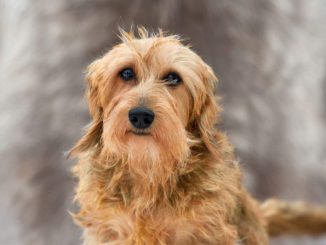


I’m so ready to have a King German Shepherd. I don’t have much skills training and my last shepherd was a total lost as it was from a man who breaded shepherds and no papers or training.
Question? Are both male and female very protective and which is hardest to train?
Hi Albert,
To answer your question first. To my knowledge, there hasn’t been any scientific research on if gender makes a dog harder to train. But I’ll leave your comment here in case anyone has some to share.
In terms of purchasing a dog without papers, I would recommend you read our article on Tips for Buying a Dog.
Hi John,
I have had many GSD over the years. The last being a 4yr old long hair that we rescued.
I would very much appreciate it if you could recommend a reputable breeder in the NY area?
It is so hard to trust anyone!
Thank you in advance.
Gianna
Hi Gianna,
Unfortunately, I can’t recommend any breeders in that area as I don’t have experience with any. My best advice would be to start by reading our article on tips for finding a reputable breeder; and then use your instinct when you go to visit the breeder. Especially if you have experience of GSDs.
We can’t forget that King Shepherd being related to the Shiloh Shepherd, has Alaskan Malamute and Great Pyrenees blood. What many articles don’t inform us that there is also some American Akita Blood, plus, of course, Germany Shepherd. That’s why this dog is more a guardian and working dog if compared to the American Alsatian or the Shiloh Shepherd. In my opinion, the real King Shepherd would be the mix among these three breeds.